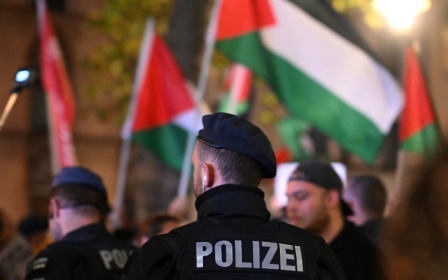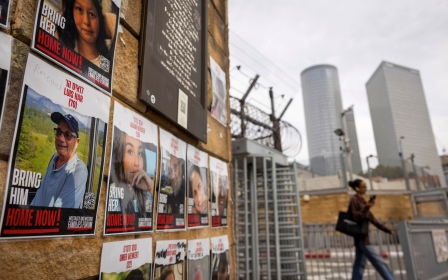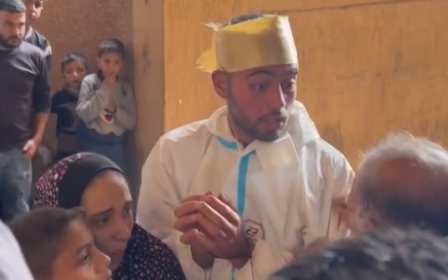War on Gaza: Egypt building buffer zone to receive Palestinian refugees, rights group says
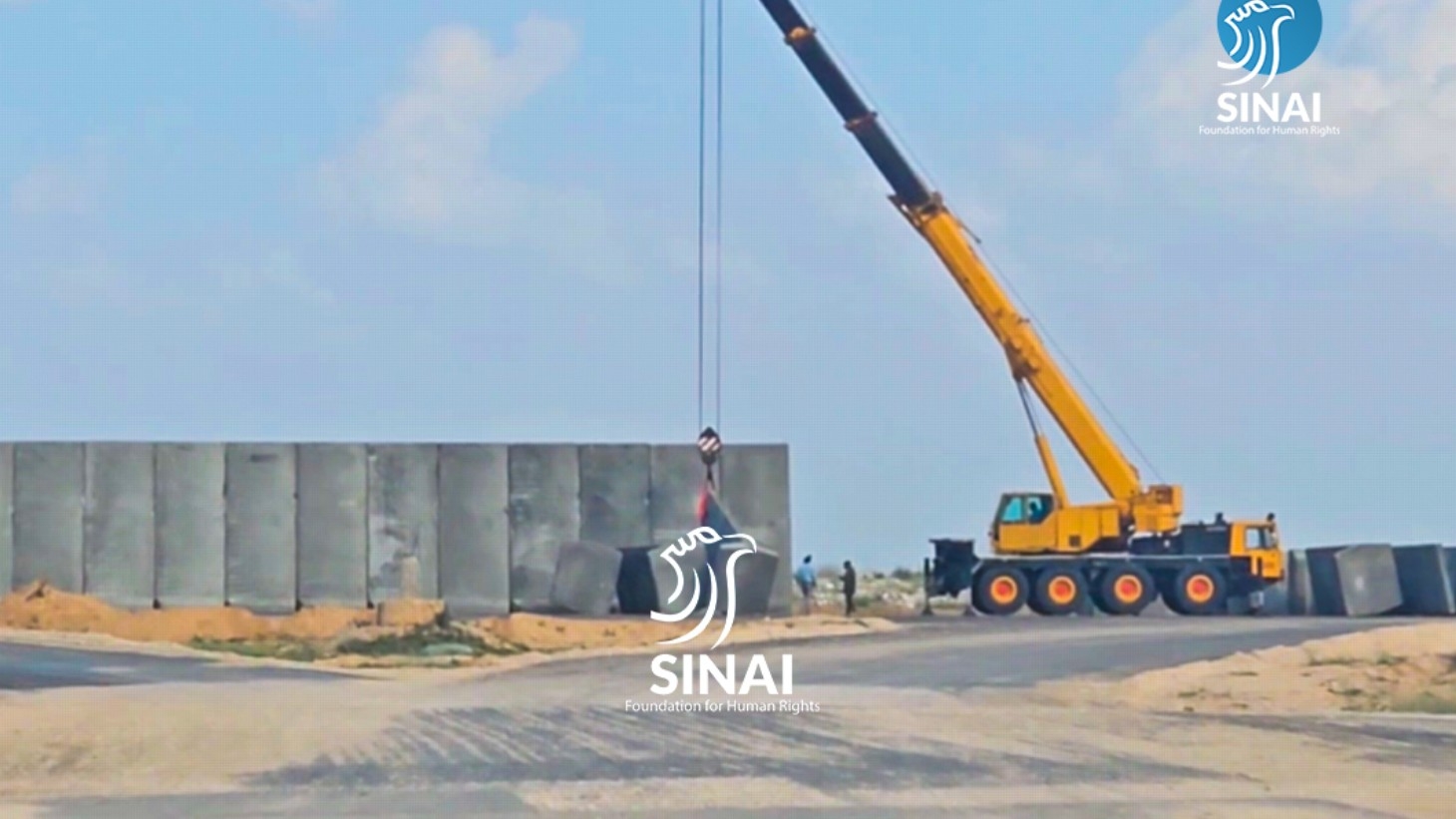
Construction is underway to create a security zone along Gaza's border with Egypt that could receive Palestinian refugees fleeing an expected Israeli assault on Rafah, according to an Egyptian rights group.
The Sinai Foundation for Human Rights spoke to local contractors, who said that the aim was to create an area in the Sinai peninsula that is surrounded by seven-metre-high walls.
The plan, detailed in a report published on Wednesday, would also pave over the destroyed homes of indigenous groups in the area.
Footage shared by the organisation showed officials in four-wheel-drive vehicles in the area, as well as a large number of equipment and bulldozers.
Earlier this month, Egyptian journalist Ahmed El-Madhoun posted a video online that showed workers strengthening the security wall separating Egypt and Gaza.
New MEE newsletter: Jerusalem Dispatch
Sign up to get the latest insights and analysis on Israel-Palestine, alongside Turkey Unpacked and other MEE newsletters
The report comes after the Israeli military has repeatedly threatened to launch a ground assault on Rafah, the southern Gaza town where at least 1.3 million people have been crammed after being displaced from other locations in the Palestinian enclave.
Since the war on Gaza began in October, there have been several Israeli proposals reported in the media detailing plans to push Palestinians from Gaza into Egypt, which Cairo has rejected.
'Facilitating mass explusion'
Tariq Kenney-Shawa, the US policy fellow for al-Shabaka, the Palestinian Policy Network, said that the buffer zone "symbolises the catastrophe and a repeat of 1948, but even worse".
Speaking to Middle East Eye, Kenney-Shawa said the zone "means that thousands, if not millions of Palestinians will either have to endure Israel's advance into Rafah, which is expected to be especially brutal, or be forced across the border into the Sinai, where they may never be allowed to return and will have to live in limbo for the foreseeable future".
According to Kenney-Shawa, if Egyptian President Abdel Fattah el-Sisi does go ahead with the buffer zone plans, it will put Egyptians in a difficult position.
"His [Sisi's] name will be forever tarnished in the eyes of Palestinians and Arabs throughout the region as the one who facilitated the latest round of the mass expulsion of Palestinians."
He added that Egyptians are being forced to either "keep the borders closed and watch thousands be massacred by Israeli forces or open the borders and be complicit in the ethnic cleansing of Gaza".
'[Sisi's] name will be forever tarnished in the eyes of Palestinians and Arabs as the one who facilitated the latest round of the mass expulsion of Palestinians'
- Tariq Kenney-Shawa, policy analyst
Kenney-Shawa also said that while the Egyptian economy is currently suffering, the country does have leverage, which he believes needs to be used "in order to avoid becoming complicit in the forced displacement of Palestinians from Gaza".
He added that the buffer zone, if complete, would "only encourage Israel to move ahead with its ground assault on Rafah because they will read it as a green light and see it as Egypt's acquiescence".
Hussein Baoumi, the foreign policy advocacy officer at Amnesty International, said that while the plans regarding this zone are so far unclear, the Egyptian president's actions undermine his claim of being concerned with what is happening in Gaza.
"Israel is clearly violating international law, and any attempts to forcibly displace the Palestinian population could be a crime against humanity, a war crime or both. Israel, as the occupying power, has the ultimate responsibility in this context," Baoumi told MEE.
He also added that the Egyptian government has cracked down on Egyptians protesting for Palestinian rights and "have failed in their obligations under the Genocide Convention to take measures necessary to prevent the violation of the convention".
He said that Egypt has also failed to exhaust all efforts diplomatically to allow for the delivery of aid via its borders, nor has the country allowed any independent observers access to Gaza through its borders.
Nearly 30,000 Palestinians have been killed in Israel's war on Gaza, the majority women and children.
'Ongoing Nakba'
Naks Bilal Vangahun, a research analyst focusing on Israel, Palestine and West Africa, said that if the reports were true, than creating a buffer zone would be "nothing short of an ongoing Nakba," and echos what happened in 1948 and 1967.
"An especially savage, genocidal campaign would be compounded. And as many Palestinians in Rafah have already signalled their readiness to stay in their land come what may, it’ll mean tearing away that sense of belonging," he told Middle East Eye.
According to Vangahun, the move would also reflect badly on Sisi.
"Sisi’s name within the Arab and wider Muslim world is already quite stained, but a move wherein he cements his position in facilitating another Nakba for the Palestinians will eternally mire his legacy," he said, adding that it could also create some internal backlash for him within Egypt.
He also believes that Egypt could be violating some international laws through their complicity.
"It would likely be difficult for Egyptian officials to deny knowledge of Israel’s intention for forced displacement, to the extent that would absolve them of potential complicity. Especially troublesome for Egypt in this regard would be complicity not just under the Rome Statute, but potentially also within the scope of the Genocide Convention."
Profiteering from Rafah crossing
Reports about the buffer zone suggest that it is linked to Egyptian businessman Ibrahim al-Organi, who is believed to have ties to Sisi's government.
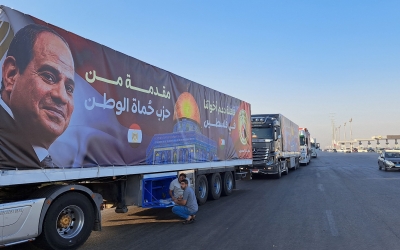
Last month, MEE reported that a company owned by Organi and parts of the Egyptian security services was profiteering from the crossing at Rafah.
An international charity told MEE that the Sons of Sinai, a construction and contracting firm, is demanding a "management fee" to allow aid to cross into Gaza from Egypt.
The Organi Group, which the Sons of Sinai is part of, is alleged in media reports to be the ultimate beneficiary of a lucrative sale of "fast-track" permits for Palestinians wishing to escape from Israel's war on the Gaza Strip.
An investigation carried out by the Organized Crime and Corruption Reporting Project (OCCRP) and independent Egyptian website Saheeh Masr found that intermediaries were selling exit permits at prices ranging from $4,500 to $10,000 for Palestinians and $650 to $1,200 for Egyptians.
“The concerning reports about the extortion of Palestinians at the border, including by a company connected to the government, suggests that the government is knowingly participating in this operation or at least unwilling to protect Palestinians from extortion," Baoumi said.
This article is available in French on Middle East Eye French edition.
Middle East Eye delivers independent and unrivalled coverage and analysis of the Middle East, North Africa and beyond. To learn more about republishing this content and the associated fees, please fill out this form. More about MEE can be found here.


